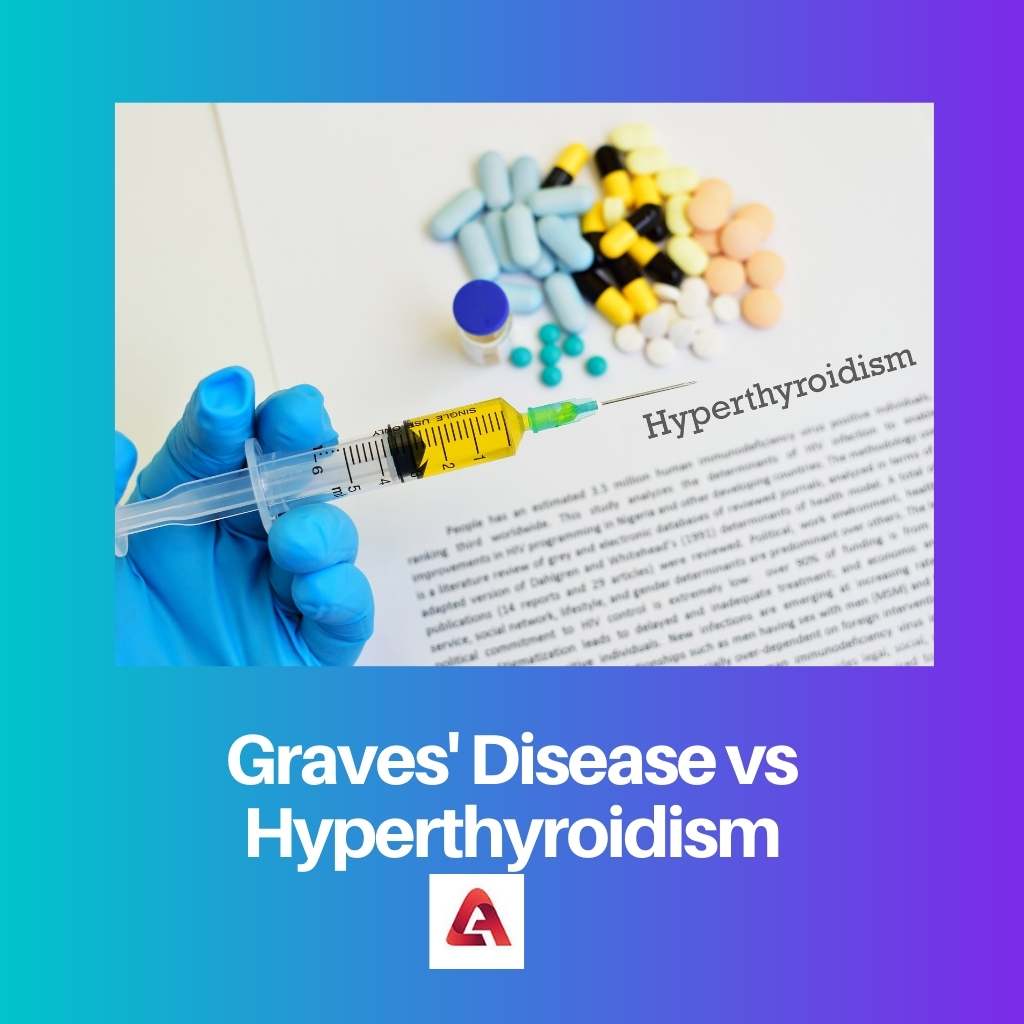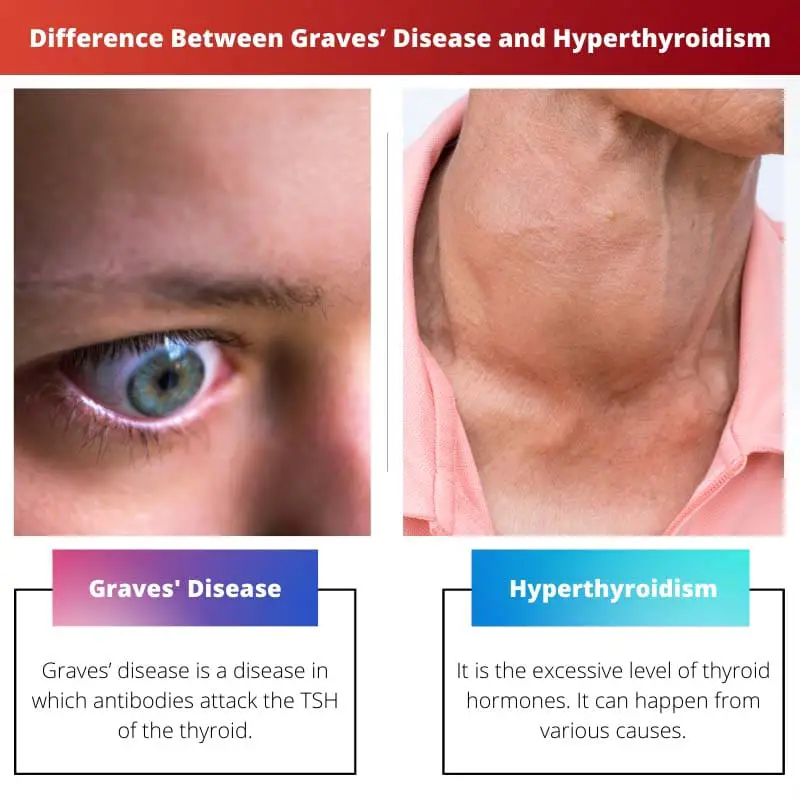The human body has various organs and glands functioning. They work in coordination to keep the body healthy. But sometimes, malfunctioning of the glands or organs can lead to diseases.
Diseases bring discomfort and wreak havoc in households.
Graves’ disease and hyperthyroidism are both diseases of the thyroid glands. The symptoms of Graves’ disease and hyperthyroidism are similar in nature, and both have excess hormones of thyroid in the blood, but they are different.
Key Takeaways
- Graves’ disease is a specific autoimmune disorder that causes hyperthyroidism, whereas hyperthyroidism refers to an overactive thyroid gland from various causes.
- Graves’ disease symptoms include bulging eyes and enlarged thyroid, while hyperthyroidism presents with weight loss, irritability, and increased heart rate.
- Treatments for Graves’ disease target the autoimmune aspect, while hyperthyroidism treatments focus on reducing thyroid hormone production.
Graves’ Disease vs Hyperthyroidism
The difference between Graves’ disease and hyperthyroidism is that Graves’ disease is a pathological condition that happens when the antibodies attack the TSH of the thyroid, whereas hyperthyroidism is an abnormality that is a result of the pathological process.

Graves’ disease is a disease that is caused by an autoimmune reaction that occurs when TSH receptors mimic the action of the thyroid gland.
This causes overstimulation of the thyroid and hormones. It is an autoimmune disorder of the thyroid. It is also referred to as an exophthalmic goitre.
The name says hyperthyroidism is a condition where the blood level of the thyroid hormones is too high for various reasons.
This disease can lead to cardiovascular problems like atrial fibrillation and heart failure. The treatment and the symptoms of this disease depend on the cause.
Comparison Table
| Parameters of comparison | Graves’ Disease | Hyperthyroidism |
|---|---|---|
| Definition | Graves’ disease is a disease in which antibodies attack the TSH of the thyroid. | It is the excessive level of thyroid hormones. It can happen from various causes. |
| Nature | Graves’ disease is a pathological condition. | Hyperthyroidism is an abnormality. |
| Eye condition | The eye condition that happens in graves’ disease is called Infiltrative ophthalmopathy. | The eye condition that happens in Hyperthyroidism is called Exophthalmos. |
| Dermopathy | It is present in graves’ disease. | It is absent in hyperthyroidism. |
| TSH level | The TSH level is always low in a patient with a graves’ disease. | TSH level depends on the cause in a patient with Hyperthyroidism. |
| Interrelationship | Graves’ disease can be a symptom of hyperthyroidism. | Hyperthyroidism is not a symptom of Graves’ disease. |
| Symptoms | The symptoms of graves’ disease include warm and flushed skin, increased sweating, loss of weight, diarrhea, anxiety, insomnia, and increased appetite. | The symptoms of Hyperthyroidism include anxiety, increased heart rate, weight loss, and development of goiter on the neck. |
What is Graves’ Disease?
Graves’ disease is a form of hyperthyroidism. It is caused by an immune disorder. It is also referred to as an exophthalmic goitre. It is an auto-immune disorder of the thyroid.
Graves’ disease is distinguished from the diffused goitre, exophthalmos, and periorbital myxoedema.
In addition, a patient can have warm and flushed skin, increased sweating, weight loss, diarrhoea, anxiety, insomnia, and increased appetite.
When the autoantibody called the thyroid-stimulating immunoglobulin binds the TSH receptors in the thyroid gland, and it mimics the action of the TSH, then there is excessive production of the thyroid hormone, which enlarges the thyroid glands, which expands the retro-orbital connective tissues and thus, weaken the extraocular muscles, pushing the eyeballs forward.
UM’s multidisciplinary group sees patients with graves’ disease all over the world. It is also involved with a well-known organization that helps patients who are coping with the disease and the graves’ eye disease.
Graves’ eye disease requires a lot of complex management.
Consuming anti-thyroid drugs like carbimazole and methimazole is effective.
What is Hyperthyroidism?
Hyperthyroidism is a condition where the blood level of the thyroid hormones is too high for various reasons.
The symptom of this disease is a result of the excess production of thyroid hormones, which increase the metabolism.
The symptoms include anxiety, increased heart rate, weight loss, and the development of goitre on the neck.
This disease can lead to cardiovascular problems like atrial fibrillation and heart failure.
It can be diagnosed with a physical exam. The causes of hyperthyroidism include a pituitary tumour, cancer of the thyroid gland, or have a multinodular goitre.
The treatment depends on the cause of the disease.
There can be many causes of hyperthyroidism, like toxic nodules, graves’ disease, subacute thyroiditis, overmedication, or excessive iodine ingestion.
Many effective treatments are available for this disease, depending on the cause. This includes medications, radioactive iodine, and thyroid surgery.

Main Differences Between Graves’ Disease and Hyperthyroidism
- Graves’ disease is a disease in which antibodies are made to attack the thyroid gland, whereas hyperthyroidism is a condition where there are too many hormones in the blood.
- Patients who have graves’ disease have an eye condition called infiltrative ophthalmopathy, whereas people with hyperthyroidism who have an eye condition called exophthalmia.
- Dermopathy is a system of graves’ disease, whereas it is not a symptom of hyperthyroidism.
- Graves’ disease is caused by the antibodies that attack the TSH receptors, whereas hyperthyroidism has several causes, like immune disorders, cancer, or thyroiditis.
- The level of TSH is always low in Graves’ disease, whereas the TSH level in hyperthyroidism can be high depending on the cause.
- Graves’ disease can be a symptom of hyperthyroidism, whereas hyperthyroidism is not a symptom of Graves’ disease.
- The symptoms of Graves’ disease include warm and flushed skin, increased sweating, loss of weight, diarrhoea, anxiety, insomnia, and increased appetite, whereas the symptoms of Hyperthyroidism include anxiety, increased heart rate, weight loss, and development of goitre on the neck.

- https://www.nejm.org/doi/full/10.1056/NEJMcp0801880
- https://www.sciencedirect.com/science/article/pii/S000293438980614X

Graves’ disease and hyperthyroidism are certainly two very distinct conditions.
The complex management of Graves’ eye disease is quite daunting.
The detailed comparison between Graves’ disease and hyperthyroidism is very significant. The information provided here is invaluable.
The autoimmune reaction causing Graves’ disease is quite fascinating.
The manner in which Graves’ disease and hyperthyroidism are explained here is truly enlightening.
The interrelationship between Graves’ disease and hyperthyroidism is an interesting concept.